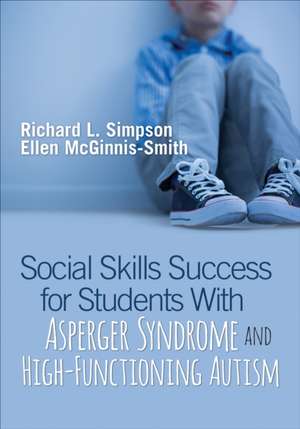Social Skills Success for Students With Asperger Syndrome and High-Functioning Autism
Autor Richard L. Simpson, Ellen McGinnis-Smithen Limba Engleză Paperback – 30 aug 2018
Preț: 238.83 lei
Nou
45.70€ • 47.41$ • 38.11£
Carte disponibilă
Livrare economică 06-20 martie
Livrare express 19-25 februarie pentru 29.18 lei
Specificații
ISBN-10: 1544320507
Pagini: 232
Dimensiuni: 178 x 254 x 16 mm
Greutate: 0.5 kg
Ediția:First Edition
Editura: SAGE Publications
Colecția Corwin
Locul publicării:Thousand Oaks, United States
Recenzii
“Packed with practical, research-based activities to support students with High Functioning Autism or Asperger Disorder, this book is the answer for teachers and parents. It provides an understanding of Asperger Disorder and High Functioning Autism with steps to improve students’ social and learning outcomes. Educators will find value in the detailed processes and activities as well as the ready-to-use materials.”
Cuprins
Publisher’s Acknowledgments
About the Authors
Chapter 1. Understanding Asperger Syndrome and High-Functioning Autism
Autism Spectrum Disorders
Children and Youth With Asperger Disorder and Other Types of High-Functioning Autism
Social Skill and Social Interaction
Physical and Motor Skill Challenges
Case Example: Stanley
Prevalence
Summary Considerations
References
Chapter 2. Social Challenges and Foundations for Successful Outcomes
Justification for Social Skill Instruction
Challenges to Social Skill Instruction
Strategies for Teaching Social Skills to Children and Youth With HF/AD
A Foundation for Social Skill Instruction
Social Skill Instructional Targets
Summary Considerations
References
Chapter 3. Social Skill and Support Methods for Learners With Asperger Disorder and High-Functioning Autism
Fundamental Instructional Methods for Children With High-Functioning Autism
Social Skill Instructional Steps for Building Social Skill Capacity and Social Interaction Competency
Summary Considerations
References
Examples: Social Skill Instructional Targets, Skill Development Steps, and Evaluation
Chapter 4. Sample Social Skill Development Program
Case Example: Jackson
Category 1: Fundamental Social Interaction, Social Relationship, and Collaboration Skill Sample Program
Category 2: Self-Advocacy, Self-Management, and Personal Accountability Sample Program
Category 3: School-Related Social Skills Sample Program
Summary Considerations
References
Chapter 5. Generalizing Social Skills: Challenges and Strategies
Planning for Skill Generalization and Transfer
Planning for Skill Generalization: Role-Playing and Practice
Planning for Skill Generalization: Coaching and Performance Feedback
Planning for Skill Generalization: Practice and Skill Rehearsal in Everyday Settings
Summary Considerations
References
Chapter 6. Supports for Structuring, Organizing, and Managing Social Learning
Supporting and Supporting and Promoting Acquisition and Performance of New Social Skills and Developing Social Interaction Competence
Environmental Modifications and Structuring Procedures
Social Skill Instructional Support Methods
Summary Considerations
References
Chapter 7. Peer Supports
Creating a Foundation of Social Acceptance and Positive Attitudes
Positive Experiences
Peer Recruitment
Using Peers to Create and Display Appropriate Models of Target Skills
Peer Involvement in Role-Play and Practice
Peer Involvement in Coaching and Performance Feedback
Peer Involvement in Assisting Learners to Practice, Rehearse, and Generalize Social Skills in Natural Settings
Summary Considerations
References
Chapter 8. Parent and Family Involvement and Support
Communication and Collaboration
Facilitating Ongoing Communication, Information Exchange, and Collaborative Relationships
Building Partnership and Skill Development and Support Relationships With Parents and Families
Selecting Levels and Types of Parent/Family Involvement
Summary Considerations
References
Index
Notă biografică
Richard L. Simpson was Professor Emeritus at the University of Kansas. He was a member of the Department of Special Education faculty for over 40 years. While at the University of Kansas he directed numerous University of Kansas and University of Kansas Medical Center demonstration programs for students with autism spectrum disorders and other disabilities and coordinated a variety of federal grant programs related to students with autism spectrum disorders and other disabilities. He also worked as a special education teacher, school psychologist and coordinator of a community mental health outreach program. Rich authored numerous books, articles, and texts on a variety of topics connected to students with disabilities. Rich was the former senior editor of the professional journalFocus on Autism and Other Developmental Disabilities. His awards include the Council for Exceptional Children Research Award, Midwest Symposium for Leadership in Behavior Disorders Leadership Award, Autism Society of Kansas Leadership Award, and numerous University of Kansas awards and distinguished roles, including the Gene A. Budig Endowed Teaching Professorship of Special Education.
